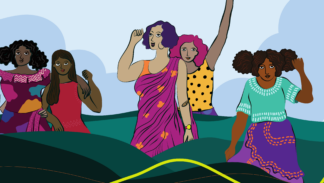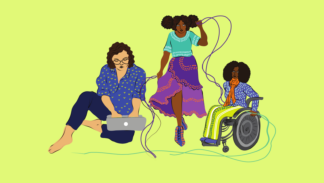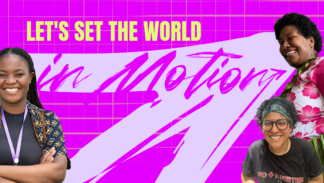Isis-WICCE
In Uganda, rural women’s voices are often unheard and their needs left unmet. But Isis-WICCE—Isis-Women’s International Cross-Cultural Exchange—has been focused on amplifying the voices of women while emphasizing grassroots empowerment.
Shortly after their founding, Isis-WICCE discovered a specific issue they wanted to help address: women were being intimidated by men in Uganda’s Internet cafés. While women were eager to learn about technology, the intimidation they experienced made them withdraw from even trying to learn.
This inspired Isis-WICCE to pilot the innovative idea to start a women-only Internet café.
However, the group struggled to find financial support for the Internet café from donors—until they connected with Global Fund for Women. “We had asked for [support for the Internet café] from quite a number of mainstream donors, but …they did not understand why we were asking for computers to teach women how to use technology,” says Ruth Ochieng, Executive Director of Isis-WICCE from 2000-2015. “Their perception was that we were not a training institution. But as a feminist organization, we work holistically… We have to utilize literally every tool that can empower women to be dignified and have self‑esteem. By that time technology was one of these tools, but there was nobody [to support our project].”
That’s when Global Fund for Women got involved. Global Fund for Women listened to Isis-WICCE to hear just how technology could change Ugandan women’s lives, then gave the organization the financial support they needed. Isis-WICCE distributed multiple computers across three women’s groups in Uganda, effectively setting up women-only Internet cafés while allowing direct contact between women and helping women leaders’ voices be heard.
“Global Fund for Women enabled Isis‑WICCE to provide a safe space for women to learn how to use computers,” explains Ruth. “For us, [creating the Internet café] connected women of the world globally, because when women came to the café, we trained them how to use the technology for networking, for advocacy, and for mobilization. The Internet café blew up the entire knowledge of women, who had been laughed at before because they didn’t even know how to use the keyboard.”
“Global Fund for Women helped me to grow. They let me navigate and find my own way of doing my work. That enabled me to become very innovative.”
– Ruth Ochieng
Global Fund for Women also supported Isis-WICCE during a critical time when it was solidifying a new purpose in Uganda: giving voice to women in conflict settings. In 1995, the organization committed to seeking out women in remote, rural locations to document their experiences as a way of giving them voice. These women spoke about surviving conflict and other issues they were facing in their lives. The interviews were recorded and used for advocacy and awareness-raising. This information shaped Isis-WICCE’s programmatic work for years to come, and recordings were shared among women in the community, transmitting stories and experiences even among women who could not meet face to face.
“This enabled us to contribute to the feminist knowledge globally… about issues of women in conflict and their contribution to peace.” says Ruth. “We were able to show that [women] are not just victims, but that they have a lot to say about war. Our documentation surprised everybody because women were no longer silent about attacks they had faced and sexual violence, an aspect that had for long been seen as a taboo.”
Q&A: Ruth Ochieng
What was the importance of Global Fund for Women’s support for Isis-WICCE?
It is Global Fund for Women that filled the critical financial gap that many mainstream donors shied away from providing us. Global Fund for Women supported us because it is a true feminist organization. It has always looked where the missing gaps of enabling women to become human rights defenders in their own right.
What other resources, besides funding, has Global Fund for Women provided?
Global Fund for Women opened doors for us to engage at international and regional platforms and facilitated Isis‑WICCE to take our beneficiaries to places like the UN Commission on the Status of Women and the African Union, so that women could speak for themselves at important global events. They helped us raise our profile at important events, and I know very well that this enabled us to be identified as the only women-led organization in Uganda that has generated knowledge on women, peace, and security.
In what ways did Global Fund for Women help you personally?
Global Fund for Women helped me to grow. They let me navigate and find my own way of doing my work. That enabled me to become very innovative, because they were flexible. For me, all that I achieved comes from feminist funders like Global Fund for Women, who gave me the space to think, to become innovative, to connect and build my team in a way that helped to transform women the way they wanted to be transformed.
[Photos courtesy of Isis-WICCE.]
Since [the first grant], Global Fund for Women became my ally, and since then until today, they are beside me and they are helping me. Every time that I request something, they answered me. We built this relationship with Global Fund for Women that is like a sisterhood.”Dr. Sakena Yacoobi


